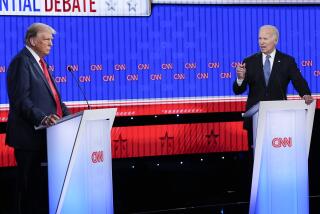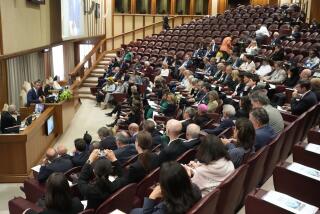Obama, Romney duel over climate change in online debate
- Share via
WASHINGTON -- At the Republican National Convention last week and in at least one stump speech over the weekend, Republican presidential candidate Mitt Romney used climate change as a laugh line ridiculing President Obama’s priorities.
But in comments to the Science Debate website Tuesday as part of an online debate organized by a consortium of scientific organizations, the Republican candidate took another position, similar to the more moderate stance he struck last year, when he conceded that the planet was getting warmer.
“I am not a scientist myself, but my best assessment of the data is that the world is getting warmer, that human activity contributes to that warming, and that policymakers should therefore consider the risk of negative consequences,” Romney said in response to a question about climate change.
Obama for his part seldom utters the words climate change, although his administration has taken several significant steps to combat it. Yet, as he has worked the last few weeks to draw clear contrasts between himself and Romney, the president has talked about climate change to younger audiences, often at colleges. To Science Debate, Obama identifies climate change as one of the most pressing concerns of the era and lists the steps he has taken during his term to mitigate it — and what he might do next.
“Climate change is one of the biggest issues of this generation, and we have to meet this challenge by driving smart policies that lead to greater growth in clean energy generation and result in a range of economic and social benefits,” Obama said.
Science Debate is sponsored by the National Academies, including the National Academy of Sciences, Scientific American, the American Assn. for the Advancement of Science and the Council on Competitiveness.
Each candidate’s comments about climate change reveal the tensions between appealing to the party faithful and carving inroads toward political centrists. Although climate science has grown more certain and sophisticated over the last two decades, discussion of climate change has become more divisive and politicized. Until recently, studies have shown that Democrats are more willing to accept that climate change caused by human activity is occurring, and Republicans more likely to reject it. But against a backdrop of mounting research and the recent effects of drought, record heat, frequent wildfires and catastrophic Arctic ice melt, a majority of Americans across parties have voiced worries about a changing climate.
Obama has long been reticent about discussing climate change before most audiences during a tight presidential race. But his comments to younger voters and college students appear aimed at rousing the Democratic base on a fundamental environmental and economic issue.
Speaking to the GOP base during the primaries and the convention, Romney dismissed the idea that the planet was facing threats from climate change. “President Obama promised to begin to slow the rise of the oceans,” Romney said, pausing for laughter. “And to heal the planet. My promise is to help you and your family.”
Perhaps in a bid to court moderates, Romney on Science Debate seems to have taken a more centrist position, acknowledging climate change.
Romney stops short, however, of accepting that human beings’ consumption of fossil fuels is the main cause of climate change. “There remains a lack of scientific consensus on the issue — on the extent of the warming, the extent of the human contribution, and the severity of the risk,” he wrote.
The overwhelming majority of climatologists accept research showing that the use of coal, oil and natural gas have driven up average global temperatures by almost two degrees Fahrenheit since the late 19th century, and a further temperature rise could pose manifold threats to countries, oceans and various species of plants and animals.
In his comments at Science Debate, Obama touts the steps he has taken to curtail emissions of heat-trapping greenhouse gases that stoke global warming, including sharp increases in vehicle fuel economy requirements, support of renewable energy sources and cutting carbon dioxide emissions from new power plants.
Romney dismisses such steps as misguided and economically harmful, but, short of supporting “research,” offers no specific solutions to tackle climate change. The GOP candidate has said that he would strip the Environmental Protection Agency of its ability to regulate greenhouse gas emissions and that he opposes more ambitious auto fuel economy standards and a production tax credit to support wind energy.
“The problem is called Global Warming, not America Warming,” Romney said. “The primary effect of unilateral action by the U.S. to impose costs on its own emissions will be to shift industrial activity overseas to nations whose industrial processes are more emissions-intensive and less environmentally friendly. That result may make environmentalists feel better, but it will not better the environment.”
Follow Politics Now on Twitter and Facebook
Twitter: @neelaeast
More to Read
Get the L.A. Times Politics newsletter
Deeply reported insights into legislation, politics and policy from Sacramento, Washington and beyond. In your inbox twice per week.
You may occasionally receive promotional content from the Los Angeles Times.











